In Radcliffe, an early novel by David Storey, one character murders another with a telling blow from a hammer. The author was later advised that Kenneth Halliwell was reading Radcliffe on the night in 1967 before he killed his lover Joe Orton, also with a hammer. But however many Orton plays Storey indirectly lost, he pulped many more of his own.
In the first part of this two-part interview the writer, who has died at the age of 83, talked about the forces which shaped him: the fact that he dodged a life down the pit to pursue his ambition to become an artist, a choice paid for by a reluctant career in rugby league. This second part concers the novels and plays.
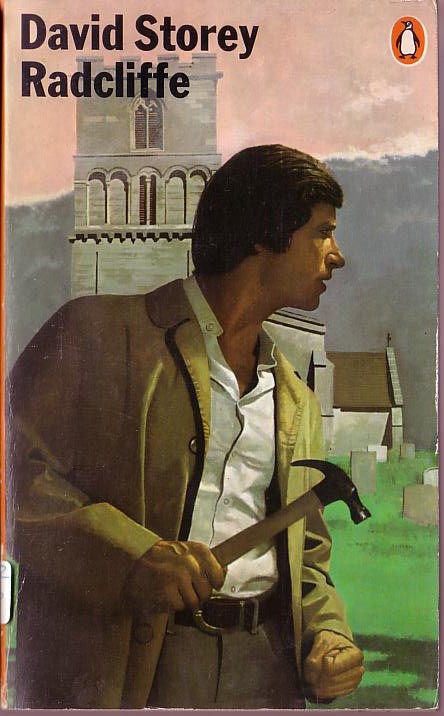
A regime change at the Royal Court in 1976, just as his own play Mother’s Day had been poorly received, found him moving on to the National Theatre. His break with the Court may not have helped that he roughed up the critics who had panned the play. In the same year he won the Booker Prize for his novel Saville (Pasmore had won the Geoffrey Faber memorial Prize in 1972). Storey talked to theartsdesk about fretting over the novels while dashing off the plays which brought him into contact with Lindsay Anderson, John Gielgud and Ralph Richardson.
Read the first part of theartsdesk Q&A with David Storey
JASPER REES: You were a novelist before you turned to theatre. Why did the switch happen?
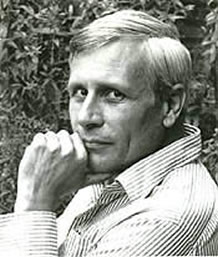 DAVID STOREY: The plays came out of desperation. The first play I wrote was before any of the novels was published. I was school-teaching in King's Cross and was so dispirited by the novels coming back - I think I had written six or seven of them and they must have been rejected something like 50 times between them - that I wrote a play over a weekend when there was a Monday off from school. On the Friday night I came home totally dispirited and found another rejection notice for Sporting Life and thought I'm clearly not a novelist. Perhaps I'll write a play.
DAVID STOREY: The plays came out of desperation. The first play I wrote was before any of the novels was published. I was school-teaching in King's Cross and was so dispirited by the novels coming back - I think I had written six or seven of them and they must have been rejected something like 50 times between them - that I wrote a play over a weekend when there was a Monday off from school. On the Friday night I came home totally dispirited and found another rejection notice for Sporting Life and thought I'm clearly not a novelist. Perhaps I'll write a play.
On the Saturday, Sunday and Monday I sat down and wrote a three-act play that seemed to come rather easily about a rather dispirited schoolteacher. Then didn't go back to it. When we were making This Sporting Life Lindsay Anderson just asked me if I'd written a play and I said I had. I typed it out and he submitted it to the Royal Court and it was accepted. In the end it came up twice and the Court lost interest in it and it was rejected by every repertory company in Great Britain that did new plays, and by the BBC and ITV. It then lay around till 1966 when this guy running the Traverse Theatre asked if it had ever been done. I rewrote and sent it to him and he did it there. That was about eight years after it was written.
Were you a theatre animal?
I had no theatre experience. I don't think I'd been to the theatre more than a dozen times in my life. The Royal Court really caught my imagination. The first play I did there they’d had for eight years before they actually did a production of it and they didn’t involve me in the rehearsals, so when I saw it it was all done as it were by these people and I’d got no affinity with theatre at all at that point. But at that stage it had this magical effect connected with the paintings I’d been doing, which were becoming three-dimensional with actual objects on the surface of the picture. And it was a three-dimensional picture frame with a proscenium and then this to-and-fro laterally and then the in-depth third dimension coming in. And I suddenly felt, that’s exactly what I would do with a painting, that kind of movement, that’s what I’ve been groping towards. And I immediately started writing all the other plays.
I wrote five quite rapidly. The Contractor was the first one. The Contractor, Home and In Celebration were all written within a matter of three or four months of each other. And I wrote three other plays at the same time, and I wrote another play also called Home and I changed it to Away. When I read it through I thought, that’s not as good as Home, so that was rejected. The other two plays I rejected as not being any good.
Are you inclined to look at them in the archive?
No, I’m pretty confident that they’re nonsense. It’s the trouble of only being able to write spontaneously. With the novel it’s awful. You spend a couple of years being spontaneous and look at what you’ve written and think, Christ, it’s awful. And you’ve lost two years and you can’t do anything about it. You’ve just got to junk it. And then you write something else for two years and look at it and think, Oh, it works.
But mostly it doesn’t. It’s a bit like dross and ashes after a fire. I've tried very hard to write plays and spend a couple of years on them and worked out wonderful themes, and they come out as illustrations of the wonderful themes but not organic writing. The only plays that have ever worked is when I start with the first line and a vague idea of what they might be about and they write themselves. And they never take more than five days.
I can say there is definite resistance to everything I write, quite candidly
Tom Stoppard agonises over plays for four years.
Well, he's more successful than I am. It shows it's a better way of doing it. I think the ideal is to think of a wonderful theme and then prepare for it and sit down and write it. I've tried to do that with novels as well and I can't do it with novels either. Clearly great novelists do that. They prepare their War and Peace by reading appropriate material and they do character sketches and think about it. I just can't do it for some reason. It's a bit like painting pictures.
How much tweaking would you do with the plays?
Not a great deal. The plays work first time or they don't work at all. In most cases they don't work at all. It's a terribly wasteful way of writing.
Are you slightly embarrassed that they took so little time to write? You’ve probably spent no more than a year writing plays.
I spent much longer writing plays that aren’t any good. The ones that worked, about a year altogether or less, I imagine, in terms of days. But as Lindsay said to a reviewer who said, “I see David Storey said he wrote Home in two days, it sounds a bit ephemeral”, he said, “He told me two days, but then there’s a lifetime’s experience behind it.”
How did the relationship with the Court develop?
When I arrived there it was in a terrible dip and its fortunes had really subsided enormously. I really belonged to the previous generation [but] the previous generation had gone: Osborne, Wesker, Arden. Their plays were not thought to be worth doing there any more, or they were not writing plays with the same engagement with society. After I arrived it coincided with what was called the second wave, which I think was comprised of me, Edward Bond and Christopher Hampton primarily. But suddenly Hampton and myself got our plays transferred, which hadn't been done for a long time, to the West End. I think seven or eight of the plays transferred.
There was a resistance within the Court, and one faction was very much ill-disposed to what was seen as the commercialisation of their work. I was very much of the opposite view, that if there was an audience for it then you put it there for it to be seen. It was seen that putting it into the West End was not what the Royal Court was about, because there was a very strong didactic, puritanical element equated with the Court. There was a sense that you went there to be instructed rather than entertained. When I did Home at the Court Gielgud was very much aware of the anomaly of an actor like himself coming to work in the theatre from an Edwardian tradition where the entertainment of the audience was the point and purpose of one's activity.
Were you friends with the Angry Young Men?
Sillitoe I used to know quite well. John Braine I knew when we both first began and then I met him again by accident in the street just before he died. He was living in very desperate circumstances and I got suddenly very close to him. And then he died. He was penniless. He had been living in a room in Hampstead where there wasn't even an adequate toilet. He had to flush the toilet with a bucket. I had known him when he travelled first class everywhere, and had a big house.
Could you have gone in that direction?
No, no, I knew then I was a different cup of tea. He was a card really. I think his life was always out of control. He wasn't educated, is what we'd say up there. He became a grotesque parody of what he might have been, and in a way the grotesquerie satisfied him.
Why did your association with the Court end in 1976?
It was a total disaster. The artistic directors changed and the one that took over [Max Stafford-Clark] was unsympathetic to my work. It wasn't until he left that I had an invitation to come back again. By the mid-1970s whatever the second wave was had begun to subside. The momentum went. There was an abortive attempt to run the theatre with a triumvirate of Lindsay Anderson, Bill Gaskell and Anthony Page, which didn't work. They were too much indisposed to each other.
In the end a kind of committee was formed, including Jocelyn Herbert, myself and Albert Finney. But it didn't stop the rancorous divisions. I suppose I needed to referee rather than take sides but it was really an unliveable solution. It was a writers’ theatre and the whole theatre is totally vulnerable to writing talent. And if a generation comes when there's not much going on then you've really had it.
Have you been much of a theatre-goer yourself?
I hate theatre audiences. They just exude an atmosphere that makes me feel slightly ill. They're probably all very nice people. I think it's temperament and a limited upbringing. If I've got time and I want to enjoy myself I'll go for a walk, but I'd probably go and look at some paintings than go to the theatre. I don’t like crowds. I don't like football matches for the same reason. Something happens to the individual in a crowd that I find alienating. Whatever it is I can only put it down to some limitation of mine because clearly the majority of people don't feel it the same way. Most of [my] contemporaries who are writers started off as actors. Osborne, Wesker, Bond, Pinter. They don’t like playwrights who write novels. People who are interested in novels don't like novelists who write plays. You're really a loser on both counts.
Have you ever felt part of that Angry generation?
I think I've been very fortunate. I couldn't get my work accepted. This Sporting Life was rejected for four years, otherwise it would have come out at the time of Look Back in Anger and Room at the Top. It was rejected by 15 publishers over those four years. It was only accepted by a publisher who covered his face in his hands and said, “Oh God, I hope I'm doing the right thing.” The first play was rejected for seven years, the poems have been rejected for 40 years, and all my plays have been rejected by the BBC and ITV. Even Home, with John Gielgud and Ralph Richardson, directed by Lindsay Anderson, was turned down by every television company in Great Britain.
Were you jinxed?
I can say there is definite resistance to everything I write, quite candidly. I've absolutely no idea. You'd have to be on the outside looking in to see what it was. I'm hoping that being out of fashion will become fashionable.
Have you ever been to Hollywood?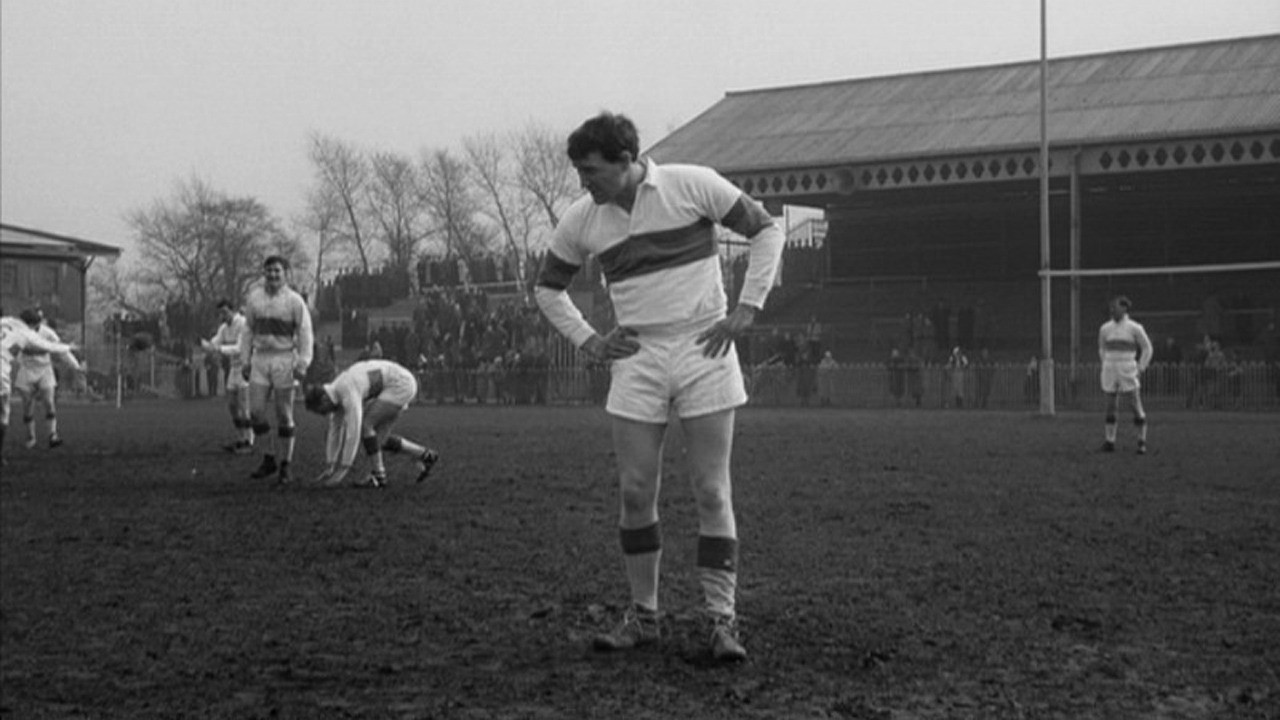 Yes, 48 hours. I came away. I was in the middle of making a film for Monitor. A Hollywood producer wanted to buy Flight into Camden, which seemed absurd in Hollywood. I decided not to go ahead with it. He’d already got – who's the woman in Sound of Music? – Julie Andrews had read it and was very keen to do it, so it all seemed straightforward. I was then approached by another American producer who would make the film on my terms. In fact I had said to the previous guy that I would go ahead if he used the actress I had recommended. He said, "Who?" I said it was an unknown actress with the Royal Shakespeare Company. I told him, and he said, “Jesus, who could ever raise a dollar on a name like Glenda fucking Jackson?”
Yes, 48 hours. I came away. I was in the middle of making a film for Monitor. A Hollywood producer wanted to buy Flight into Camden, which seemed absurd in Hollywood. I decided not to go ahead with it. He’d already got – who's the woman in Sound of Music? – Julie Andrews had read it and was very keen to do it, so it all seemed straightforward. I was then approached by another American producer who would make the film on my terms. In fact I had said to the previous guy that I would go ahead if he used the actress I had recommended. He said, "Who?" I said it was an unknown actress with the Royal Shakespeare Company. I told him, and he said, “Jesus, who could ever raise a dollar on a name like Glenda fucking Jackson?”
This guy said if I thought she was OK it was OK by him. On that basis he sent a first-class ticket to fly to Hollywood. I went on my own and when I arrived at Los Angeles airport after a 13-hour flight I was a little bit punchdrunk and I was in the middle of trying to make a film. To my horror my name was called as I approached the barrier, and I was sent through a VIP section, and the guy I had already met I recognised was to my horror standing talking to the producer who I had rejected. They both looked embarrassed and I said, "Are you connected with this?” “No, no, no, I was just passing through, but nice to see you.” In fact this guy had been set up by the other bloke and they really wanted to acquire the rights and gradually ease the author out.
Did you ever go back to Hollywood?
I've never been back. I regret not sticking it out but as I say I had to get back to something. It was a film called The Death of My Mother, about an episode in the life of DH Lawrence where he's teaching in London and he goes back on the news of his mother dying from cancer. He and his sister effectively kill her. I found that journey... I could hang on that journey all sorts of statements about England. In fact it had a strange effect.
I had made only one other film before that. Huw Wheldon offered me a five-film contract to make anything I liked, and then a British producer offered me a feature film. At 30 I was suddenly caught: do you want to be a writer or a film director? I went through several weeks of acute torture of trying to resolve if I could do both. In the end I decided no, I had to stick with writing. Always in life you get another road to go down. That's what I often regretted not having gone down.
You turned down a lot of money.
That was always the difficulty, turning down the money. The money was always in the end an easy decision. It was difficult because I knew I'd got four children to support and also I had foolishly for six months got a house for my parents. As the six months extended into 20-odd years, I realised I had two households to support.
Did plays make more money than the novels?
It was very difficult to make a living, certainly just as a novelist. It was during that period that [there was] the notion of writing film scripts, which was a constant request. I only did one. Karel Reisz was going to make a film of Flight into Camden at some stage and in the end said he wouldn't and said, would I like to write a script of Ned Kelly? I was very much struck by the story. In a way we both saw it as an extension of Sporting Life. I spent quite a long time writing that and worked with Karel and Albert Finney and got really absorbed by it. The two of them went out to Australia and found locations and Karel came back and said he'd decided not to make the film.
I never clearly understood why, apart from being a daunting prospect. By that time Peter O'Toole was going to be in it, too. So it was well cast. I decided then that I wouldn't ever spend time writing film scripts again. Karel came back and asked me to write Isadora. But I said I didn't think I wanted to push through a lot of speculative writing any more.
Was Reisz a close friend?
I wouldn't say close, but without him my life would have taken quite a different shape. I had met him once when he was shooting Saturday Night, Sunday Morning. Tony Richardson was wanting to film Sporting Life and he took me down to the studios where they were filming Saturday Night and asked me to watch a bit and introduced me to Karel who was then directing his first feature film. Some time later after the film had come out he said he was interested in producing Sporting Life. “Are you interested in writing it?” He introduced me to Lindsay Anderson who was rehearsing Billy Liar at the Cambridge Theatre with Finney, and so I met Lindsay, which had a very significant effect on my working life.
It turned out that Lindsay had made his first four films on the housing estate where I had lived as a boy. We could very easily have passed each other in the street. Very, very strange. In his final film there are several people I knew, including one of my brothers.
The theme of the young man having an affair with an older woman runs through your work. Why?
When I was talking about Arnold Middleton, it suddenly struck me. I hadn't thought of that. In fact I've never been particularly fascinated by older women myself. It obviously refers to some kind of insecurity of some sort. But its nature I'm not too confident about. I couldn't think of any older woman, even when I was a young teenager. It clearly is something to do with confusing of sexual and maternal forms of insecurity. And they coalesce in this kind of image. My mother was a very restrained person emotionally, so it may be grounded in that in some way. There's an absent mother figure who wasn't realised when I was young in some way, therefore I compensate.
Of all the plays In Celebration seems to be the one to have the closest to an autobiographical stamp on it.
It has. It’s got formative experience in it but it’s been extrapolated in a different direction. So there’s a nucleus of familial experience in it and then the imaginative element involved. When I was writing it I tended to divide my own nature into three parts which I was becoming increasingly aware of. One was a very passive nature, the second was a kind of conformist nature, and the third was a kind of bullshit nature that didn’t want to have anything to do with the other two. And they formulated themselves in the shape of three brothers and related back to experience of being brought up in that kind of environment.
He’s obviously in need of a psychotherapist, at least, and is trying to retrieve himself from the deadening experience of the circumstances of his birth where his mother was in a kind of traumatised state from the death of a previous child. That was my own particular predicament. For six months I was swilling around in her hormonal discharge of grief and whatever came through the placenta.
And then when I first came to grips with her in my early 30s, really, I tried to find precedents for the influence of maternal trauma on foetuses. I couldn’t find any, and then I came across an experiment at Berkeley in America. Two scientists had got 12 mice pregnant in a cage and set the cage in a very critical condition of lights and bells going and tilting floors, irregular food, and all the 12 mice became totally traumatised. And then when they were giving birth they were put in a totally safe and secure place and they gave birth to mice which then began to demonstrate all the symptoms that their mothers experienced in the other cage. But the mothers all calmed down and reverted to normal but the discharged mice, until they died, eventually preserved all the sign of trauma.
Why did you choose to return to rugby league in The Changing Room?
Watching a previous play called The Contractor at the Fortune Theatre on a Saturday night, I'd just been talking to the actors in the green room, then went to the back of the stalls to watch them come on and suddenly thought, that's a play. In fact, I sat down to write a play called The Green Room and then I thought, I'm sure there must be other plays within this theme and it's not very original. But the transposition from the people in the green room to the characters on the stage and back again I thought was quite fascinating.
I suddenly realised that you could transfer that to a changing room before, during and after a match, and it was a room that was changed by the people coming into it and going out of it. It was also a room that changed the people who came into it and went out of it. They all were transformed and depersonalised to the extent that they put on a uniform and then went out and came back and take off the uniform and return to their previous appearances. I sat down to write a play accordingly.
You had John Gielgud and Ralph Richardson in your play Home before Harold Pinter used them. How and why did you cast them?
In fact both the actors’ careers were to them, alarmingly, going down, and Ralph was finding work difficult to get. And Gielgud was very apprehensive. The theatre he represented he felt was now disappearing rapidly. First of all they sent the play to John Mills who turned it down. And then talking to Lindsay, he said, “Well, why don’t we start at the top and work down, rather than starting at the middle and working down, which we normally do?” So he sent it to Gielgud, and I was told he was going to come in and talk to us.
And I remember him coming in and Lindsay and I sitting behind a desk at the Royal Court and thought, this is absurd, interviewing this eminent actor, who looked incredibly nervous. And he said to Lindsay, “I always knew you didn’t like me.” He said, “How on earth could you possibly say that? I’ve never said anything.” So there was a little contretemps at the beginning and he was reassured he was liked.
But afterwards he wrote in one of his autobiographical books that the thing that decided him to do it, because he didn’t understand the play at all, and had been very, very surprised he had been sent it, the thing that decided it was David Storey’s smile. I can’t remember smiling. I must have been smiling. I think it was a mixture of wonder and amusement. I thought, how can such an eminent actor be so nervous and so lacking in self-confidence? It seemed extraordinary. Was it performing or was it real? It was real, in fact.
Did you discuss the play?
We didn’t talk about it. Lindsay said, “It’s a good play, you don’t have to worry about it.” I think it was desperation. He didn’t know where to go any more in terms of acting. And he was seen as a passé figure at that point and the notion of doing a new play in a theatre which was anti-Edwardian theatre - it was a theatre that you went to to be instructed in life - was both alarming yet novel and intriguing.
I don’t know whether it was him or someone else who said, “Well, perhaps Ralphie might be interested.” And then he told us a story of about how Ralphie [was] in a play at the Haymarket and he was told the writer was coming to meet him if he was available and give him something he’d written. And out of boredom he just said yes, and this guy came in with a rucksack on his back who was obviously staying overnight somewhere in some hostel and gave him a play and said, “I just think you’d be very suited to one of the parts in this play. I’d be very privileged if you’d read [it].”
And when Ralph told me, he said he read it and couldn’t understand a word of it. And he gave [it to] Gielgud and Gielgud said, “Definitely no good, do not do it, Ralphie, it’s a total mistake.” “And so I didn’t do it,” Ralph said. And I think the man’s name was Samuel Beckett and it was called Waiting for Godot.
Gielgud brought it up several times, this terrible mistake he’d foisted on Ralph, that he felt this time if he was going to stick his neck out perhaps Ralph would stick his neck out as well. It was just a generational thing of thinking, here’s a younger generation who are interested in me and have actually sent me a play which they think I can do, although I can’t see any way of doing it myself. What have I got to lose because I’m really stuck at the moment? So they both were in a very similar predicament when we started rehearsing.
Did you get on with them?
Enormously. I particularly got on with Ralph. We formed quite a close bond. When I first went round to talk to him he poured some liquid into a glass and filled it to the brim and then he had his own glass filled to the brim and started drinking, and I said, “What is it?” And he said, “Gin.” I thought, Jesus.
He was a wonderful character. I wrote a play for him, which was a mistake because you shouldn’t write for an actor, which in the end he turned down because it was too long. And then he was prevailed [on] by Peter Hall and Lindsay to do it eventually. I sent him the revised version and he rang me up and said, “It’s much improved, I think I can do it.” I didn’t tell him it was exactly the same script he’d turned down previously. So he did it.
We had quite a time before we did it, discussing. Lindsay was in Hollywood at the time, so we spent several Sundays. He’d ring up one Sunday and say, “It’s fine, it’s fine, it’s just the beginning I’ve got a problem with.” And then the following Sunday, “It’s the middle that I think is a bit of a muddle. If you’d just come round.” And then on the next Sunday, “I think the end has got a little problem now.”
And then finally he said, “I’ve solved all the problems, if you just come round we’ll have a cup of gin and I’ll show you my wheezes, I think they’re very good wheezes.” We sat overlooking Regent’s Park at his desk, side by side, it was like a lectern. And he went through the whole script in which he’d marked out all these wheezes. They were all terrible mistakes.
I said, “You’re ironing out the whole corrugations in the play and making it so smooth there’s hardly any play there at all.” “Oh, well.” He crossed them all out. “They were only wheezes.” He said, “I’ve been trying to learn it by heart before I sign a contract to do it at the National.” I said, “That’s a mistake, I’m sure you shouldn’t do it.” He said, “I don’t know whether I can learn. I need to know I can learn it before I sign a contract. I’ve learnt the first 15 pages. Do you want to hear me?”
So he went through them in a faltering way, and kept missing out lines and chunks, and then closed the book. “Fifteen pages, there you see, I think I can do it. Any missing bits?” I said, “Well, just one or two. Oh, I didn’t notice them.” Tears came into his eyes and I thought, Oh Christ, we’ll never get him onto the stage. But he did do it in the end. We spent a year or a year and a half, all over the place.
Did you feel as much at home at the National?
No. The Court went through a period where they didn’t like my work at all, run by Max Stafford-Clark, and that lasted for 13 years so I rather lost what felt like home. I went to the National because it was the only alternative, I suppose.
Who did you give a new play to first?
I usually gave it to Lindsay. I always felt confident in the ones I did send. There’s an awful lot I didn’t send which are now in the archive. I felt I was good for seeing the ones that would work and those that wouldn’t. And he never rang up and said, “It’s very good.” The highest praise he could give ever was, “Well, at least it’s authentic.” Which indicated that he had misgivings but he thought he could get round them.
Were you friends?
We were in one way and not in another. I think in his diaries it says that after 30 years he’d come to the conclusion I was a loner. Friendship with him was very difficult. He used to say, “Well, I think Laurel and Hardy never spoke to each other between films.” We did meet regularly and have meals together and we did talk on the phone regularly as well. But he had an inner circle of friends who were all very dependent on him and it was difficult to disentangle them from him. I thought they brought him down rather than elevated him. They all had major problems and two of them committed suicide. So in a way it was hard to get through, but when he had major problems to do with his personality I think I was the only person he felt safe enough to talk about instead of seeing a doctor.
He was a very self-tortured individual. The destructiveness came out of an inability to deal with certain things within himself and he externalised them in this kind of – at the end of his life – rather venomous strain. The last play we did together was at the National, Stages, and he was ill, really. Alan Bates at one point took me aside and said, “If Lindsay goes on being Lindsay in this fashion I’ll piss off. I’m not going to take any more.”
The play had been done at the National with Richard Eyre on the basis that I’d control Lindsay. Richard Eyre said, “I’m afraid, as a director we think he’s outstanding but I don’t think we want to employ him. For instance the electricians don’t want to work with him again.” The first I’d heard of it. This was after the Ralph play, I assume, or it might have been The March on Russia.
But in the end he was taken back there solely on the grounds that I could keep him on a leash of some sort, which in the end it was just about possible to do. He was one of the most remarkable people I ever met. He was such a quick thinker and so bright intellectually and also a very good writer about theatre and films.
Did he intuitively understand your writing?
We had a very strange relationship which I found perhaps stranger than he did, which was sort of symbiotic. He made his very first film based in an engineering works at the top of our housing estate in Wakefield which I knew very well because I used to play round the stockyard there when I was young. And then he made five films in Wakefield, documentaries, four for the engineering and one of the Wakefield Express, which is a very good film about the local newspaper. And in it were many people I knew. He saw his first rushes in the cinema at the end of our road.
And all the time we weren’t aware of each other. I was living there and he was making these films. It was pure fortuity that he came to be able to make Sporting Life. I only knew him as an intellectual by name at the time, not his films. And then I was astonished at his skills, and he had all this experience of my home town and not only my home town but the local council estate where I’d been brought up.
And the fact that we came together by pure chance to make Sporting Life seemed to me there was a destiny involved in some extraordinary way because there was a very strong opposition to him directing the film, and in fact he was fired after two weeks of shooting because he was so far behind on the schedule and Rank panicked and asked Karel Reisz who was the producer to take over, and Karel said he wouldn’t and insisted that they carried on with Lindsay.
So when we came to do the plays I always felt there was this affinity. In working together we never had any problems until the very last play when he was really too ill to direct it.
How did you get on with Richard Harris?
Fine, I think. He was very deferential because he couldn’t quite place me. And I thought he was too big a life, too big a character to be close to. He was too destructive probably. And then of course the relationship between him and Lindsay was so stormy and I tried to hold the middle ground. I felt it was almost an impossible task really but in the end we managed to stagger through. The making of the film was an actual nightmare in terms of trying to keep these two warring natures apart: Lindsay’s obsession with Richard and Richard’s resistance to being obsessed about but rather liking it because he was an actor.
What was the basis of his obsession?
There was a homosexuality in Lindsay which he could never really come to terms with. It underwrote his social attitude in fact, and his anti-English venom which he sustained throughout his life, really.
Did it inform his relationship with Gielgud and Richardson?
Not at all. He remained very good friends with Gielgud. He used to go round there to his estate quite frequently, whereas I seemed to instinctively gravitate towards Ralph. I just found him a wonderful character. When he wasn’t acting he didn’t quite know what to do. Gielgud was only real when he was acting. Apart from that he didn’t know what to do or how to be. His everyday was very much focused on acting. Whereas Ralph had created this magnificent eccentric character he would play between parts, and of course there was a great deal that actually was eccentric, so that was authentic in many respects.
Your plays seem to be about how your post-war generation of young men were lifted out of their roots.
Alienation is a … Once when I read some of the work I’d written to try and work out where the hell I was going, I suddenly realised that everything I’d published in novels and plays at that point was all characterised by a feeling of loss. Loss seemed to be a common element of everything I’d written. Then I assumed that must be the loss of my eldest brother which I only experienced as a foetal experience as it were, and that I was brought into the world with a loss implanted as it were in a hormonal way, in a chemical way, in the brain. But then I’ve never looked backwards since then, so I don’t know whether the loss continued to be a prevalent quality.
Auberon Waugh once said that it's about time north-country working-class novelists wrote about something other than north-country working-class novelists.
Angus Wilson thought it was the best writing to come out of England since the death of DH Lawrence. I thought, it’s probably a subjective reaction, this
It probably was.
You seem particularly to have been your own subject.
It's probably the only way I can write. I suppose all art is regional. You hope that you identify something in the region which is universal.
But you yourself are the locality with your fiction?
I think they're all subjective novels in that sense. I'm really stuck on the source rather than [them] being novels of narrative or social experience beyond the author.
After This Sporting Life, the novel which made a real impact and won the Booker Prize, there was Saville. Why was it such a success?
I got tired of the reviews of the previous two novels. I thought I’d left all the significant elements in them to be discovered within the text, as it were, rather than being pointed out by the author. The “this is a significant scene coming up so read it carefully” kind of signal. And so I remember writing Saville putting in all the signposts, saying, “This is important, just look at this bit here or don’t think much of this little bit here, it’s not really of much relevance.” I just thought it was a very self-indulgent dictatorial exercise and at the end of it thought it was a bizarre concoction which I somehow at the time got away with.
The reviews were extraordinary. And I think I got a letter from Angus Wilson, who I didn’t know at all, saying he thought it was the best writing to come out of England since the death of DH Lawrence. I looked at it again and thought, it’s probably a subjective reaction, this. I think there’s a Lawrentian element and also a Dostoevskian element and also a Brontë element. These were all the signposts I was carefully putting in for critics for reviews.
I remember wanting to celebrate Dostoevsky, the powerful effect I’d had as a student reading Crime and Punishment and thinking, why can’t you have an English novel on that kind of scale and intensity, and why do you never get English writers who can write about something called a soul without sounding pretentious or forcing it, whereas Dostoevsky gets a soul on almost every page and you’re with him the whole time? So it was a kind of elemental writing which was lacking in English writing, I felt. So I never really went back to that genre.
Of which of your novels are you proudest?
I’m not sure any of them. There are some very simple novels like Flight into Camden. Ken Loach was going to make a film of it at one time and was prevented from doing it by the producers who wanted him to make another film instead. He’d re-read it and wrote about it in one of the papers saying it stands up just as it stood up all those years ago and he wanted to film it. But that’s a very brief novel which I wrote in three weeks and never had any trouble with, it just came out and that was it.
And there’s another novel called Pasmore which I also wrote very quickly as part of this major novel which I couldn’t get to work, and that in fact was filmed by Richard Eyre. He did a television film of it. That again was a novel that because it was fairly short it worked. But the bigger, more ambitious novels, I suppose like all large novels, have ups and downs within them.
Would that include Saville?
That too came out without any kind of effort. I remember writing at a rate of 8,000 words a day and thinking, it can’t be any good coming out so fast. And then put it all together and thought, no, it’s no good. It’s been too easy writing it. And gave in another novel to Jonathan Cape, I think it was called A Travelling Man, and after I’d given it in and they’d accepted it I was about to sign the contract, I thought I’ll just re-read it, I’m not sure, oh, this is rubbish as well unfortunately. And told Tom Maschler that I wanted that novel back, I didn’t think it was any good.
And he said, "You can’t have it, I’m already going to publish it." I said, "I haven’t signed a contract yet." I said, "I can give you another one. I’ll swap that one for that one." He said, "OK, well, are you sure the one you’re going to swap with is going to be any good?" I said, "I think it works because it came out so easily." So I gave him Saville and took back The Travelling Man and never published it. That’s in the archive as well. another junked manuscript. So Saville rather determined its own career. I was surprised when it came out that it was received.
Was it a surprise to win the Booker?
Very. It was published the same week that I did the last play at the Court called Mother’s Day. I remember the Sunday Times on its arts page the headline was “Triumph and Disaster for David Storey”. There was a wonderful review of Saville and a totally rubbish review of Mother’s Day, which indeed got absolutely appalling reviews. It’s when I hit a few critics after the reviews.
It has been a solitary working life.
I think the plays were a saviour really.
Any regrets at that?
No. Temperamentally, I had no alternative.
Can't work with other people?
I can, but the whole time the itch is to get on my own and get it down.




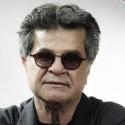



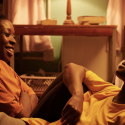
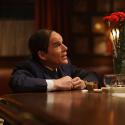




Add comment